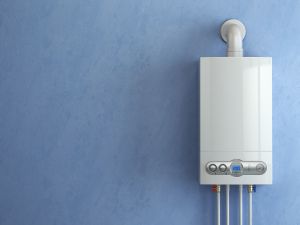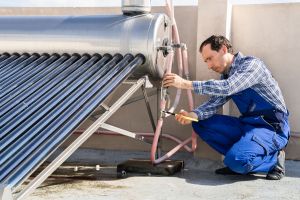We know having a constant supply of hot water is essential in any happy household. So, if your house seems to be running a little cold, you might find yourself wondering if it’s time for an upgrade. Canstar Blue can help you understand everything you need to consider.
What’s on this page?
- Sizing a hot water system
- How much hot water does a shower use?
- Types of hot water systems
- Gas vs electric hot water systems: What’s best?
- Can you use off-peak electricity for hot water systems?
- Are solar hot water systems better?
- What’s the best size hot water system for a family of four?
- Why choosing the right size hot water system is important
Sizing a hot water system

Hot water systems come in a number of sizes, ranging from 25L to upwards of 400L. Finding the right size isn’t simply a matter of selecting a system big enough – too small and you run out of hot water, too large and you end up paying through the nose for hot water you never used.
Here are the main factors to consider when deciding what size hot water system you need:
- Your household size: How many people live in your house and how does this affect the frequency with which you use hot water? For example, consider how many showers people take or, how often you use the dishwasher, washing machine, or bath.
- How many showers and outlets your system will need to service: This will include how many bathrooms, taps, and hot water outlets you use every day.
- How much water your household uses: As a general rule, each person will typically use 50L of hot water per day, so if you’ve got a family of four, you’re looking at 200L of hot water daily. This may be more if your household uses unusually large amounts of water, such as if you have a spa bath or two washing machines. You may need a larger tank, or an additional instantaneous system, depending on the type of hot water system your house is supplied with.
- When (at what times) your household uses the most water: What does peak time look like for your house – is it two showers and a dishwasher in the evening, or is it a washing machine, dishwasher, bath, and handwashing in the morning? Pinpointing when your household uses the most water helps you understand what your maximum capacity water use is, and which size hot water system can accommodate it.
- If you have a dishwasher: A modern dishwasher uses about 15L per load on average. While that may be less than handwashing, it’s a considerable amount of water to take into account when sizing your hot water system.
- If you have a washing machine with hot water: Washing machines can use huge amounts of water, so much so, that some machines with lower water ratings can use up to 130L at a time. If you have a washing machine with a large capacity or, one with a low water rating, you will need to factor this into sizing your hot water system.
- The type of shower heads you use in your bathrooms: Different types of shower heads use different amounts of water, and there are some shower heads are created to use less water. For example, aerated shower heads mix jets of air in with the water, drastically reducing the amount of water used without comprising water pressure. Understanding what type of shower head you have, is essential to understand what tank size you need, as this is probably where you will most regularly use hot water.
- Gas or electric: Gas and electric hot water systems are priced differently. It may be more economical for you to choose a tank size based on the heating system you have in place. Check out the table below for a guide on tank size options based on gas or electric heating.
Smart tip: Some hot water system providers offer water heater sizing calculators which use information about your household to tell you what size you will need. You can usually find these on hot water installation company websites.
Here’s a general guide for what size water heater you will need, based on your household size, and the type of hot water system you have.
Electric hot water system sizes
| Household size | Peak usage | Tank size |
| 5-8 people | High | 400L |
| Low | 250L | |
| 3-6 people | High | 315L |
| Low | 160L | |
| 2-4 people | High | 160L |
| Low | 125L | |
| 1-3 people | High | 125L |
| Low | 80L |
Gas or LPG hot water system sizes
| Household size | Peak usage | Tank size |
| 5-8 people | High | 340L |
| Low | 170L | |
| 3-6 people | High | 260L |
| Low | 160L | |
| 2-4 people | High | 160L |
| Low | 135L | |
| 1-3 people | High | 135L |
| Low | 190L |
This is a general guide sourced from Australian Hot Water
How much hot water does a shower use?
On average, a shower will use 15L of water per minute. So, during a 10-minute shower, a person can use up to 105L of water per shower! This number will, of course, change based on some factors including:
- The duration of your hot shower
- How hot your shower is
- The type of shower head you own
Flow rates for showers are written as litres per minute (L/min), which means that for every minute you shower, a certain number of litres is being used. When it comes to saving water, we all know that taking shorter showers is number one, but the type of shower head you use is also incredibly important. A water-efficient shower head can not only save you water, but also money.
The Australian Government Department of Climate Change, Energy, the Environment and Water has put together a scenario to serve as an example of possible savings.
They have based their calculations on an 8-minute-long shower, per person, per day, with water costed at $2.99 per KL. Please note: water prices differ for each state and fluctuate over time, this is only a general analysis.
For a family of four, replacing a shower head that flows at 15L/min with one that has a better Water Efficiency Labelling Scheme (WELS) rating would amount to the following savings:
- a three-star rated shower head at 9L/min will save 70kL and $210 each year on water bills
- a 4-star shower at 6L/min will save 105kL and $315 each year on water bills.
Shower water usage rates derived from Ausgrid.
Types of hot water systems
There are two main types of hot water systems: storage systems and continuous flow (or instantaneous) systems. Both can use one or more energy sources to heat water, including gas (LPG and natural gas), electricity, and solar power.
Storage hot water systems
Storage hot water systems store and heat water in an external tank.
How it works: Cold water flows into the bottom of the tank, is heated by a heating element, and is then released at the top of the tank into pipes, where it finally flows out through hot water taps. This type of system can store a lot of hot water, but as it requires water to be continuously heated, it’s the least energy-efficient option.
There are a few pros and cons to storage hot water systems:
| Pros | Cons |
| More likely to already have a tank hot water system installed, saving on costs | Keeping water consistently heated uses high amounts of energy |
| Low installation cost | Take up space |
| Energy star certified | Expected lifespan of around 10 years |
| Large amounts of hot water ready to use | Tank systems may only serve households of a certain size |
Instantaneous hot water systems
Instantaneous hot water systems do not use a tank to heat water, but instead, heat water that already flows through house pipes.
How it works: Cold water flows through pipes and passes through a heating element. The heating element instantly heats the water, and it then flows out through the hot water tap. This system provides instant hot water, but can only heat small amounts of water at a time, making it best suited for households with fewer than five people.
There are a few pros and cons to instantaneous hot water systems:
| Pros | Cons |
| Hot water on demand | Lower water pressure |
| Hot water never runs out | Higher installation cost |
| Saves energy by only heating water that is needed | Inconsistent water temperature across multiple appliances |
| Compact designs save space | May require additional equipment to function |
| Expected lifespan of around 20 years | May require more long-term maintenance |
Read more: Your complete guide to hot water systems
Gas v electric hot water systems: What’s best?
For the premise of this section, ‘what’s best’ is going to be assumed to be, ‘what is financially best for me.’ To properly answer this question, we need to break it down into the type of hot water system you have: instantaneous or storage. If you missed it, we break down the differences between the two in the beginning of this article.
Is gas or electric better for instantaneous hot water systems?
While gas has always generally been the cheaper power option, recent fluctuations in wholesale prices for gas and electricity now mean this is not always the case. As, with an instantaneous hot water system, you only pay for the heating of the water you use, the pricing will fall more on the amount of water used rather than the energy used to heat it – so both gas and electricity can be financially friendly choices.
That said, gas does have some added benefits such as:
- Cheaper supply charges
- Cheaper usage charges
- Faster heating times (which means less gas used, and less gas paid for)
- There are no ‘peak’ and ‘off-peak’ tariffs to pay for
Note: this only addresses natural gas, but does not cover bottled gas. Powering the hot water needs of a household with bottled gas would be a more expensive option than both installed gas or electricity.
To accurately understand the impact on your power bill in this instance, you will need to look at the specific electricity and gas rates in your area, and the energy efficiency rating on your hot water system. Keep in mind that even a gas-powered instantaneous hot water system will still require electricity to carry out some basic functions, so factor this into your costing.
Is gas or electric better for storage hot water systems?
Electric hot water systems are generally more expensive to run than gas hot water systems. However, this will depend on the size of your tank, the sort of electricity you use (solar or coal-powered) and the type of electric hot water system you have (heat pump or tank). Heat pump and solar systems cost more to buy, but are ultimately the most energy efficient, and cheapest to run.
Benefits of an electric hot water system include:
- Cheaper than gas to buy
- Cheaper than gas to install (typically costing between $1,000-$2,000)
- Can heat your water during ‘off-peak’ times at night when electricity is cheaper
- A heat pump hot water system (which is technically a hybrid electric system) is highly energy efficient because it extracts heat from the surrounding air to heat water, as opposed to relying on electrical currents alone.
- A solar-powered hot water system is the most energy-efficient and will be the kindest to your wallet. In this case, electricity powered by solar would be far better than a gas system.
To get the most out of an electric hot water storage system, opt for the system with the best energy efficiency rating.
Benefits of a gas hot water system include:
- Heats water faster than electric systems
- More energy efficient than grid electricity systems (but not solar or heat pump)
- Can continue to function even during power outages
- A solar-powered hot water system with a gas booster is a highly reliable system
The greatest disadvantage of a gas system is the expensive, upfront installation cost (typically between $1,500-$3,000) and the space and ventilation requirements that come with installation. It’s worth investigating your options for combined storage hot water systems (like a solar-powered and gas-boosted system), as it could save you a considerable amount of money in the long run.
Read more: Gas hot water system prices & usage costs
Can you use off-peak electricity for hot water systems?
Yes, can you use off-peak electricity rates if you have an electric storage or instantaneous hot water system. If you’re signed up to a ‘time of use’ or ‘flexible pricing’ tariff, you pay different prices for ‘peak’ and ‘off-peak’ electricity rates. ‘Off-peak’ rates are often between the times of 10pm and 7am. If you’re powering your hot water system with this electricity pricing scheme and you’d like to keep the costs of running a hot water heater down by connecting the system to an off-peak tariff, you’ll need to install a larger system as it will need to supply hot water to your home for the whole day and will only reheat at night (during off-peak times). If you’re using a storage system, this would be a larger tank.
Read more: Peak and off-peak electricity times explained
Are solar hot water systems better?

In general, solar hot water systems are the best option for most (if not all) households of any size, as they are the cheapest to run and most energy efficient. Even though they are costly to install initially (to the tune of $3,000-$7,000), this will be quickly offset by reduced energy bills. The government also provides a number of incentives and rebates, some just for domestic renewable energy system installation. For information on how you can access these rebates and incentives, visit your state government website.
What’s the best size hot water system for a family of four?
Considering the water usage needs for a family of four including how many long showers your household takes, at what time of the day you use the most water, how many bathrooms and taps you have, and accounting for about 50L per household member will be a good start when deciding what size hot water system you will need. In fact, many hot water installation services use this family number as a reference when suggesting tank size for storage systems.
Best size storage hot water system for a family of four:
- Electric: 125L-160L
- Gas: 135L-160L
Best size instantaneous hot water system for a family of four:
If your family is using an instantaneous hot water system, then the ‘size’ of the system is dependent on the number of hot water outlets being used in the house rather than the size of the household. As a general rule, if your household tends to use more than four hot water outlets at the same time, for example, a dishwasher, washing machine, and two showers, then it’s recommended you install additional instantaneous hot water system units to meet your hot water needs.
Why choosing the right size hot water system is important

Choosing the right size hot water system is essential in saving you money and water. If you install the wrong size hot water system, you’ll run into a few major problems including:
- A hot water system that is too big will have you paying for the heating and storage of water that isn’t being used.
- A water heater that is too small will mean you run out of hot water regularly.
- If you decide on an instant hot water system, and it’s too small, you will not be able to get hot water from multiple hot water taps at once.
By carefully considering your household’s water habits and using the information in this guide, you can feel confident in choosing the right sized hot water system for your home.




Share this article